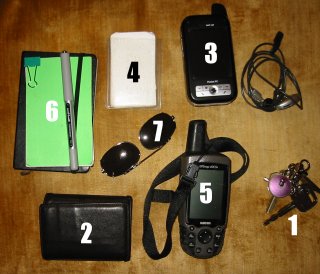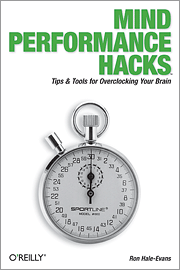Chapter 1 of Mind Performance Hacks is devoted to techniques for improving your memory, a topic that has fascinated me since I first discovered Yates’s The Art of Memory. It combines a simple, traditional memory system (rhyming pegwords) with an application (remembering a list of things that you take with you when you leave the house on your daily perambulations).
This may seem a bit silly, but I’m occasionally absent-minded enough to pack my lunch and leave it on the counter or forget to grab my work ID badge on the way out the door.
I used to have several pairs of excellent cargo pants that served as a sort of combination reminder system and carry-all (wallet in the left-front zippered hip pocket, badge in the right leg pocket, and so on). Despite functioning most satisfactorily as a handless (if geekish) murse, sadly, this system didn’t help with my lunch as it wouldn’t fit in a pocket.
Over time, I’ve tried to engineer things to minimize the chances of something important being left behind: a box near the door holds my keys, wallet, and such, and M—— recently constructed a recharging station where our cell phones and my GPS live. Even so, something occasionally does get left behind.
MPH #1 suggests the use of a simple memory system, one that is often mentioned in books on improving one’s memory. This is a good choice on Ron’s part, as it is an easily accessible introduction to the principles of practical mnemotechnics. The system associates a rhyming word (the ‘peg’, upon which memory images can be hung) with each number from one to ten: one is ‘gun’, two is ‘shoe’, and so on. The list in MPH differs slightly from the list that I learned, but the specific words are unimportant, as long as they’re consistent.
When I first learned the system, back in college, I tried using the pegwords as a short-term ‘scratchpad’—a way to remember a grocery list, for example. After some initial enthusiasm, I fell away from using the system. One of the goals of MPH is to build the hacks into your life and brain, much as a useful utility like Quicksilver can permanently transform the way you interact with your computer. The only way to achieve this is through repetiton and continuous use.
Here’s my initial list of things that I need to bring with me every morning and their pegged associations (numbers 8 and 9 not pictured):

- One is ‘gun’: keys. I picture myself firing a gun that shoots keys. The keys bury themselves in the wood of the back door of my house.
- Two is ‘shoe’: wallet. I imagine myself holding one of my shoes. Instead of a tongue, it has plastic sleeves holding the cards from my wallet. I pass the shoe over the proximity reader at the university library, and it beeps.
- Three is ‘tree’: cell phone. I picture one of those ludicrous cell phone towers half-heartedly disguised with short, pine-like branches and not looking at all like a real tree. My cell phone dangles from one of the branches as if it has been lynched, strung up by its headset. This image reminds me that I need to bring both my cell phone and the headset.
- Four is ‘door’: work ID. I picture the screen door of my house as a giant ID badge, swinging slightly in the breeze and banging againts the door frame.
- Five is ‘hive’: GPS. This image is of a traditional beehive, with hundreds of bees buzzing around it. Each bee carries a tiny Garmin GPS and flies around in looping patterns to communicate her path to her hive-mates.
- Six is ‘sticks’: Note-taking apparatus, which is currently a Moleskine notebook and Hipster PDA. I picture a cone of sticks, laid for a fire. The Moleskine lies in the middle and index cards are woven into the sticks.
- Seven is ‘heaven’: sunglasses. A simple, cartoonish image of St. Peter at the gates of heaven wearing a cool set of shades.
- Eight is ‘gate’: my bag. I have a rolly bag with a telescoping handle to transport my laptop and books about with minimal stress on my back. I imagine the handle as a wrought-iron gate. It rises up from the bag, clicks into place, and swings open.
- Nine is ‘wine’: lunch. I picture Stephen Fry as Jeeves handing me a packed picnic hamper and a bottle of wine. He frowns disapprovingly at the thermos mug that I am holding, and I have to set it down to take the hamper.
This is sufficient for my initial list I think, and I’ll use this as a mental checklist as I leave the house each morning over the next week or two. I’ll post my experiences and conclusions about this hack at that time.
